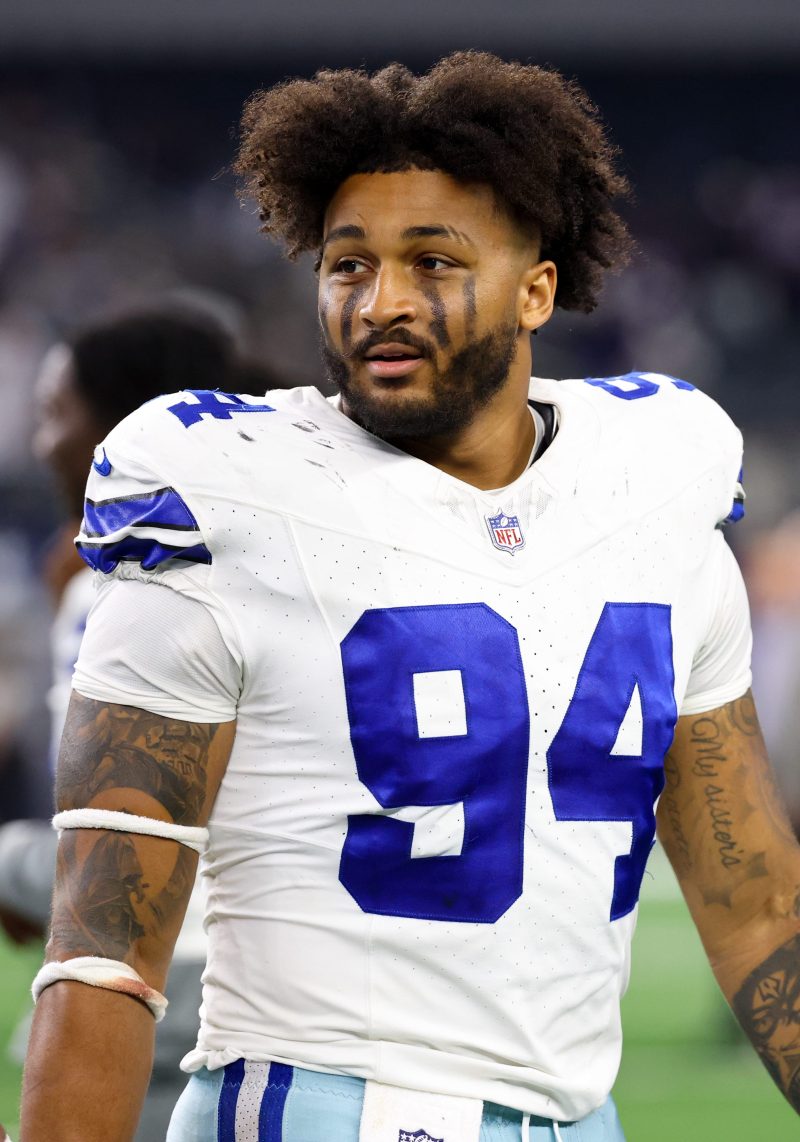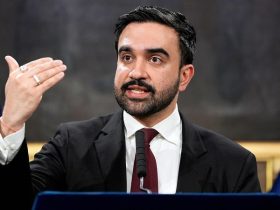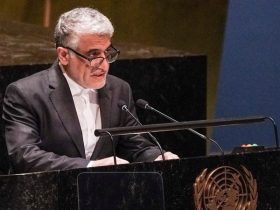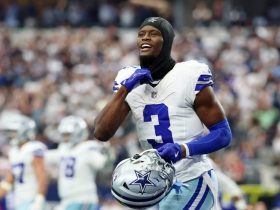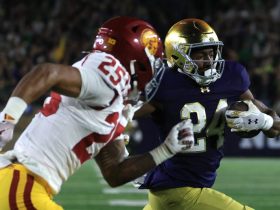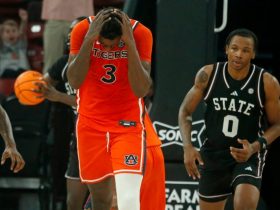Marshawn Kneeland’s death by suicide has reverberated far beyond his Dallas Cowboys teammates.
For the Cowboys, experts say, the remainder of the season won’t be business as usual as players and staff move forward.
This article discusses suicide and suicidal ideation. If you or someone you know is struggling or in crisis, help is available. Call or text 988 or chat at 988lifeline.org.
Marshawn Kneeland replied to a text message with praying hands.
That image is firmly planted in the mind of Greg Ellis as he tries to process the tragedy, Kneeland’s death by suicide, that has rocked the Dallas Cowboys and NFL universe.
It was their last exchange, roughly two months ago. Ellis, the former NFL defensive end who coached Kneeland last year but is no longer on the Cowboys coaching staff, reached out on Sept. 3, a day before Dallas opened the season at Philadelphia, with a message of encouragement about Kneeland’s development as a football player.
Kneeland responded, “Yes, sir,” Ellis remembers, and added the emoji.
Now, Ellis is second-guessing himself for not trying to do more – and wondering whether he missed clues that signaled distress. After all, Ellis is a mental health advocate who created and wrote the script for an independent film, “My Dear,” about such issues. And he suspected the young defensive end, who lost his mother weeks before he was drafted in the second round by the Cowboys in 2024, could have used support that involved more than honing football skills.
“My heart goes out to his family. Then I instantly go into what-could-I-have-done mode,” Ellis told USA TODAY Sports. “In hindsight, obviously, I wish I would have followed my instinct and sent more text messages, to let him know that I am here. And that, even though I’m not coaching him anymore, I’m still here for anything he would need to talk about.
“So, you just look back and you think he was a bright, smiley guy, but he was also a guy that had a deep sadness look about him through a lot of things. I felt that in him, I saw that in him, and I just wasn’t around him enough to help him deal with that.”
It is unknown whether Kneeland, who was 24, sought or received treatment provided by the Cowboys, or the NFL and the NFL players union for mental health concerns. His body was discovered early Thursday morning in Frisco, Texas, during a search that included the use of a drone after Kneeland fled on foot following his vehicle’s crash on Dallas North Tollway. Police and Texas state troopers had pursued Kneeland for an apparent traffic violation.
According to emergency dispatch audio from the Frisco Police Department posted by The Dallas Morning News, Kneeland sent a goodbye text to family and friends. It was also relayed on the dispatch that his girlfriend, Catalina, told authorities that Kneeland had mental health issues, was armed and would “end it all.”
‘I should have known better’
Such details add to the anguish that Ellis, and undoubtedly those in Kneeland’s inner circle, are experiencing. Ellis, who played 11 of his 12 NFL seasons with the Cowboys, spent one season as an assistant defensive line coach with the team but wasn’t retained after Brian Schottenheimer replaced Mike McCarthy as head coach earlier this year. Ellis said he didn’t try to engage more with Kneeland this year because he didn’t want to undercut the existing coaching staff. He now wonders if he should have tried another approach.
“I’m not an expert or anything like that,” Ellis said. “But I am a committed activist for mental wellness. That’s why, for me, it’s ‘I should have known better.’ I should have followed my instinct to reach out a whole lot more than I did, but I was trying to respect the boundaries as I’m not coaching over there anymore.”
This is what happens for family, loved ones and others connected to the victim in the wake of suicide. They reflect, rehash and examine from so many angles, seeking answers that may never be concretely revealed. Often, if not always, the first question is why? It typically coincides, experts contend, with reflections about signs that might have been missed in leading up to the tragedy. On top of that, there is angst considering whether they could have made a difference that prevented the outcome.
Added Ellis, “I hate that he had to suffer.”
Suddenly, a Cowboys squad (3-5-1) bogged down by a bad defense and the prospects of another season of failing to live up to massive hype, has a crisis that has nothing to do with football. When the team reassembles for practice on Monday after a bye this weekend, the healing process – not just for the players and coaches, but also for others in the organization – will weigh heavily in the equation with the normal matters of their operation.
Cowboys quarterback Dak Prescott revealed that the team held a Zoom call on Thursday, which illustrates the urgency of the team’s response. Cornerback Josh Butler shed light on the team’s emotions on Friday as he posted a photo on Instagram showing several bouquets of flowers left at Kneeland’s locker. He added the inscription, “Love you dawg.”
It can’t be business as usual.
“Well, yes and no,” Yolanda Brooks, a clinical psychologist who previously worked for the Cowboys, told USA TODAY Sports. “The season is not going to stop because of this. You still have things to do. For some, getting back to work is a good distraction. It gives you something else to focus on, because the situation is going to keep ruminating in your mind. When you look at something, you’re going to be reminded of it. You have to push through and work through that.
“That’s hard, because you don’t know what a trigger is going to be. Some people, who were closer (to Kneeland) than others, might have struggles sleeping, or not have an appetite, or are just highly distracted. Restless. Being able to talk about it, engaging with others, is important. Even if you’re not talking about it specifically.”
Ask 4 Help
Prescott, the Cowboys’ classy quarterback and undisputed team leader, said Thursday that it was difficult to balance his emotions regarding Kneeland’s death. Prescott, who wears the hand-written message, “Ask 4 Help” on his wrist tape during games, lost his older brother, Jace, to suicide in 2020. He called it “a triggering day” as he spoke to reporters following a ceremony at his old high school in Haughton, Louisiana.
Like Prescott, Cowboys defensive tackle Solomon Thomas also lost a sibling to suicide. Thomas’ sister Ella passed in 2018. Both Thomas and Prescott have established foundations committed to suicide prevention and will be leaned on as locker room leaders while the Cowboys grapple with their loss.
In a heartfelt post on X, Thomas wrote: “Brother Marshawn, I love you. I wish you knew it was going to be okay. I wish you knew the pain wouldn’t last and how loved you are. I wish you knew how bad we wanted you to stay. My heart breaks for you and your loved ones. We will lift your spirit up every day.”
As you might expect, Kneeland’s death – days after he scored his first NFL touchdown by recovering a blocked punt in the end zone on Monday night – resonated in every locker room in the NFL. On top of an outpouring of emotional reaction from several coaches and players, including former teammates Micah Parsons, Rico Dowdle and DeMarcus Lawrence, Ravens coach John Harbaugh described a flow that could help detect hidden signs of distress.
“In the world, there are just a lot of challenges people face,” Harbaugh said during his Thursday press conference. “We encouraged our guys just to keep an eye on one another. Look out for one another. Ask questions. See how people are doing. Take care of yourself. Try to be connected.”
‘This doesn’t go away quickly’
Today, the Cowboys have to navigate an unexpected ordeal that will rely heavily on first-year coach Brian Schottenheimer’s leadership. Next time, another team likely will be forced to address a real-life situation that puts football in a different context.
Ask the Buffalo Bills. In early 2023, safety Damar Hamlin’s heart stopped beating on the football field as he made a seemingly routine tackle during a primetime game at Cincinnati. Hamlin was resuscitated by first responders during a tense, emotional delay that included players from both teams kneeling in prayer and several openly weeping. The game was called off and ultimately canceled, but for months, Hamlin’s career was in doubt.
The possibility that a player could die on a football field forced the Bills to engage in crisis management for a type of emergency never experienced.
“All these situations … there’s no exact playbook,” Bills general manager Brandon Beane told USA TODAY Sports. “You try to plan for everything, and I’m sure the Cowboys have a plan for how to handle it, but it’s just devastating.”
Hamlin recovered and has resumed his career. Yet Beane’s perspective about Buffalo’s situation is valuable in understanding the challenge for the Cowboys.
“Each situation has its own caveat to it,” Beane said. “There’s no wrong response for anyone in your organization. You just try and have counselors and people available through the healing process.
“This doesn’t go away quickly,” he added. “In our situation, fortunately Damar made it out of that thing, but it rattled our organization past that season. Hearts go out to everyone. I know they’ll work through it.”
Erase the stigma
Brooks, who teaches and operates a private practice in Dallas, recognizes the widespread attention the tragedy has generated because Kneeland was a member of the NFL’s most visible franchise – and one that has faced myriad crises involving off-the-field situations for players over many years.
She is adamant, however, about the need to view this tragedy through a much broader lens, considering rising suicide rates and societal pressures.
“This is not a Cowboys issue,” Brooks said. “This affects mostly everybody. Especially now. Why? Look at our society. Look at the world. And I’m not talking about the politics. I’m talking about the loneliness, the isolation, and how technology has detached people, so that you have to text somebody just to get a feeling or a connection, because there’s nobody physically around you.”
Whether isolation was a factor in Kneeland’s decision is unclear, and Brooks was careful not to infer that.
Kneeland, who hailed from Grand Rapids, Michigan, and starred at Western Michigan, unexpectedly lost his mother, Wendy, in February 2024. He wore a necklace that contained her ashes.
Yet it would be grossly unfair to draw any conclusions, particularly without intimate knowledge of Kneeland’s circumstances and state of mind.
“Who knows what goes through the minds of people?” Brooks said. “Sometimes, it’s impulsive. They see it as a quick way out, and they don’t see any other way.”
Said Ellis: “We just have to continue to learn about mental disorders, mental health and what mental wellness looks like. Let’s continue to erase the stigma, so people can feel better about reaching out for help and receiving help, and we can feel better about extending that hand of help.”
Especially if we were better equipped to recognize the signs.

